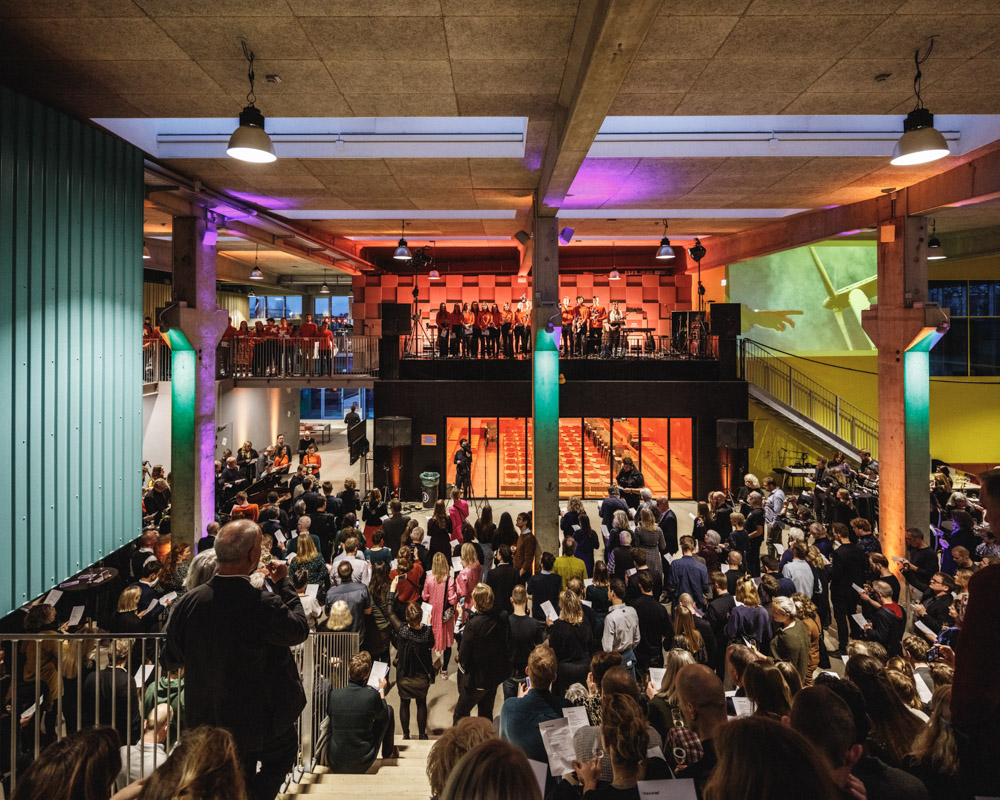About
The idea of Roskilde Festival Folk High School came to be in 2004 during a seminar at the Gimle venue in Roskilde, where the municipality focused on the development of a new urban area surrounding the former concrete factory, Unicon.
In 2005, a committee of representatives from Roskilde Festival, Roskilde Municipality, and a task force dedicated to the folk high school convened to prepare the first steps. In 2008, the Roskilde Festival Association donated the first funds for the school. Jesper Øland became the first principal of the school in June 2009, and was tasked with creating the values and professional foundation for the school, as well as raising local support and the necessary finances for the construction.
In 2010, the school hosted its first course in relation to the Roskilde Festival. A team of around 30 students created a folk high school in the empty concrete factory, also known as Hal10. No one knew at the time that this was the very building that was to be transformed into a brand new folk high school. This was also where the students identified the need for the abbreviation, RoFH.
The story continues after the images.

‘The Festival Folk High School’, the first course of RoFH, 2010
Inauguration of Roskilde Festival Folk High School, 22nd of February 2019

On March 27th 2017, construction of the school began, and the school opened on the 6th of January 2019. The first semester of students was a group of 70 people, between ages 18 and 30. RoFH was officially inaugurated on the 22nd of February 2019, and on this occasion, the Danish rock band Nephew wrote a new version of the song ‘At dø er at rejse’ (To die is to travel), as the official opening song of the school.
In the statutes of our school, it is written: “Roskilde Festival Folk High School will in the school’s courses and daily life create a space for immersion and inspire people to act and to realize ideas and dreams with others.”
Based on Roskilde Festival’s focus on music, art, and change, RoFH provides a wide range of courses, primarily in music, leadership, design, sound & lighting, film, and art. “We build communities” has become the central theme for the first new folk high school in Denmark in 50 years. Teachers, students, and staff during a stay at RoFH will in collaboration build and create a unique environment and purpose based on our values.
In January 2020, Hans Christian Nielsen became principal of RoFH. The year began with the first sold-out semester of the school. Shortly after, the global Covid-19 pandemic forced RoFH to find new paths to run a school based on a festival that was now canceled. This has led to new, strong arts and culture projects and formats – for example, ‘Solidarity during lockdown’ in collaboration with Turning Tables, and our first GRASP, a festival for new ideas in partnership with Roskilde Festival, Roskilde University, ROMU and the municipality.
The creation of Roskilde Festival Folk High School has been supported from all over. The combined budget for the establishment was approx. 160 million DKK, where the primary donors were Realdania, A.P. Møller Fonden, Roskilde Municipality, and the Roskilde Festival Association.
The values of the school are influenced by the ideals of non-profit, the need to create, and volunteering engagements that make up Roskilde Festival as we know it.
Values of the school
Roskilde Festival Folk High School is a common folk high school, located in the creative urban area, Musicon, in Roskilde. The values of the school are influenced by the ideals behind the annual Roskilde Festival focusing of non-profit, the wish to create, and volunteering engagements.
We join the Danish folk high school tradition, and put life lessons, education of the people, and democratic empowerment at the core of our purpose.
We believe that art can raise questions, inspire, and build bridges between differences and unite people across cultures, which is an important part of any democratic society. That is why we focus on the significance of art and culture in people’s lives, communities and our democracy.
We want a sustainable future for all. Therefore, environmental and social sustainability is embedded in everything we do at the school.
We believe that the best learning is achieved on a foundation of curiosity and individual motivation. In our opinion, learning is also elevated when based in the real world, and the source of good ideas is found in the meeting of theory and practical experience, between professionalism and cross-cutting projects.
We believe that the individual person is strongest in a community consisting of differences, and that the best communities are built when people meet each other with openness, curiosity, and the desire to learn and understand one another. That is why we will embrace the equal and dynamic relations between different views and perspectives.




